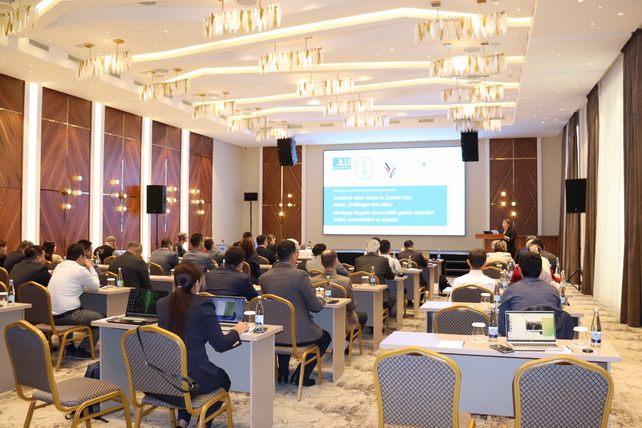
Development of Livestock Value Chains in Central Asia Discussed in Tashkent
Development of Livestock Value Chains in Central Asia Discussed in Tashkent
Tashkent, Uzbekistan (UzDaily.com) — A regional technical seminar titled “Value Chains in Livestock Production in Central Asia: Current Status, Challenges, and Policy” was held in the capital of Uzbekistan.
The event brought together more than 50 representatives of government agencies, research institutions, the private sector, and international organizations involved in livestock production and agricultural policy.
The seminar was organized by the Center for International Development and Environmental Research (ZEU) at Justus Liebig University Giessen (Germany), the Food and Agriculture Organization of the United Nations (FAO) in Uzbekistan, and the German-Uzbek Dialogue on Climate-Resilient Agriculture.
Participants discussed the current state of livestock value chains in Central Asian countries, the integration of small farmers into markets, sustainable feed production, and regional cooperation in combating animal diseases.
Opening remarks were delivered by Maripa Kichinebatyrova (FAO Uzbekistan), Dr. Azamjon Nurmatov, Director of the Research Institute of Livestock and Poultry under the State Committee for Veterinary and Livestock Development, and Professor Dr. Martin Petrick of Justus Liebig University Giessen.
During the event, researchers presented the results of the international project “Trans-Livestock: Economic Integration of Livestock in the Transboundary Region of Tajikistan and Uzbekistan,” funded by the Government of Germany.
The project, implemented from 2022 to 2025, focuses on studying cross-border cooperation in livestock farming, trade in livestock products, rational pasture management, and the integration of the livestock sector into the regional economy.
Project partners include the Tajik Academy of Agricultural Sciences (Khujand), the Research Institute of Livestock and Poultry (Uzbekistan), the Center for Agricultural Research and Innovation (CARIS, Samarkand), and the FAO Subregional Office for Central Asia (Almaty, Kazakhstan).
Participants discussed the roles of small and large-scale livestock producers, mechanisms for farmer cooperation with market players and government bodies, ways to improve public service efficiency, and the broader question of whether market forces or the state should play the leading role in agricultural development.
According to project leader Professor Martin Petrick, “The discussion on the role of rural youth attracted particular attention — how independent they can be in shaping their future and what resources they need to achieve it. These issues are especially relevant for a young country like Uzbekistan.”
Experts emphasized the need to strengthen economic cooperation in the livestock sector, improve pandemic preparedness within the One Health framework, and enhance collaboration between science and policymaking.
The seminar concluded with the development of recommendations aimed at promoting sustainable livestock development, fostering regional trade, and strengthening scientific and technological partnerships in Central Asia.
Uzbekistan, with its extensive experience in agricultural reform and digital transformation of farming, once again confirmed its leading role in regional efforts to enhance food security and rural sustainability.
The outcomes of the Tashkent seminar will serve as a foundation for continued dialogue and joint initiatives aimed at developing a competitive and environmentally sustainable livestock sector in Central Asia.